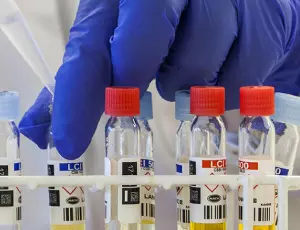Just over a year after the start of the pandemic, SARS-CoV-2 variants are emerging across the world. British, South African and more recently Brazilian, these potentially more contagious mutations of the virus are worrying authorities and the public alike. On January 15, the WHO Emergency Committee called for increased virus genomic sequencing and data sharing, as well as better scientific collaboration on the critical unknowns that still remain. Veolia is actively working to ramp up research and knowledge of the subject.
For several months now, Veolia has been working with local authorities to anticipate the upsurge of the epidemic on a regional scale via its offer VIGIE COVID-19 and, using the RT-qPCR method, to detect SARS-CoV-2 in wastewater. Cities such as La Valette, near Toulon in France, have thus entrusted Veolia with analysing their wastewater with a view to offering largescale screening campaigns based on the results and anticipating hospitalization peaks by several days.
In addition to this offer and in response to the virus' mutations, the Group's Research & Innovation laboratory is conducting an experimental approach aimed at sequencing the SARS-CoV-2 genome in wastewater in order to identify its variants. An innovative approach in France.
#Covid_19 | #Wasterwater becomes the indicator of the health status of the population.
— Veolia (@Veolia) December 2, 2020
Vigie-Covid-19 warning system could lead up to better estimations by including people that haven't been tested and that have no symptoms. (@Loopsidernews) pic.twitter.com/cd82I7hDLU
A partnership of excellence with the IPMC
Veolia has entered into a partnership with the IPMC (Institut de Pharmacologie Moléculaire et Cellulaire) - a joint research unit combining the CNRS (Centre National de la Recherche Scientifique) and UCA (Université Côte d'Azur), to track SARS-CoV-2 variants in wastewater. Its Nice Sophia-Antipolis functional genomics platform, part of the France Genomics network, has the most efficient high-throughput sequencing technologies in the region.
The team led by Dr Pascal Barbry is recognized for its scientific excellence in the field of RNA sequencing, bioinformatics and biostatistical analysis and since the first lockdown has acquired solid experience in SARS-CoV-2 analysis. It has been working on an application in the field of wastewater for several months. The interest for us lies in being able to deploy this approach on a national scale and offer our local authority clients a further decision support tool to add to the public health arsenal they already have, explains Philippe Sébérac, Veolia's Chief Scientific and Technological Officer.
Once their genomes have been entered into the databases, this technique makes it possible to identify all the variants.
We have been testing this nanopore sequencing technology on wastewater since September with teams from the city of Nice. It's a proven technology, which is cheap and very fast as we can obtain reliable results in less than three days. The sequencing technique makes it possible to decipher the virus genome and identify the few mutations that modify the sequence: some of these mutations may modify the properties of the strains, which could multiply more rapidly or more easily infect their hosts. Our analyses allow us to build the virus' ID and identify the presence of dangerous mutations. It is a powerful and highly reactive early warning tool if deployed on a large scale and at regular intervals, explains Pascal Barbry, research director at the CNRS and member of the France Génomique infrastructure.
Reassuring initial results
The initial results obtained by the IPMC on 10 wastewater treatment plants operated by Veolia, whose sampling and analyses were carried out during the first half of January, revealed the presence of the main European SARS-CoV-2 variants in wastewater, but did not detect the British, South African or Brazilian variants, up to the limit of the 1% detection provided by the approach. These results, obtained from the 10 sites, are reassuring and in line with those presented by Santé Publique France in its weekly epidemiological update on January 14, 2021, which in particular estimates that the incidence of the British variant is probably responsible for 1 to 2% of the cases of COVID-19 currently diagnosed at national level.
A valuable new tool
Identifying the presence of all the SARS-CoV-2 virus variants in wastewater treatment plants would make it easy to establish an accurate and low-cost map of the circulation of the various SARS-CoV-2 mutations throughout France, and represent a new and important indicator in fighting the spread of the epidemic and the presence of high-risk mutations. Applied on different scales, from a neighbourhood to a metropolis or region, it could thus give local authorities an additional individual diagnostic health tool, for example to guide local screening strategies in those areas where particular variants have been identified or step up the roll-out of vaccination in the most affected areas
Veolia wants to continue its research efforts on the genomics of viruses found in wastewater in order to establish consistency between what is found in WWTPs and the circulation of the virus in the population, and once again be able to better assist public authorities in anticipating successful health strategies.



